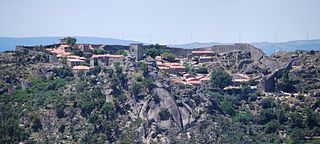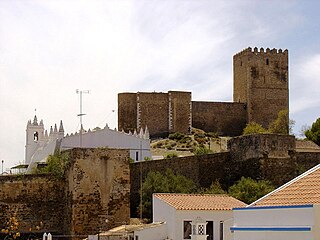
The Castle of Almourol is a medieval castle atop the islet of Almourol in the middle of the Tagus River, located in the civil parish of Praia do Ribatejo, 4 kilometres (2.5 mi) from the municipal seat of Vila Nova da Barquinha, in Portugal's Oeste e Vale do Tejo region. The castle was part of the defensive line controlled by the Knights Templar, and a stronghold used during the Portuguese Reconquista.

Portuguese Gothic architecture is the architectural style prevalent in Portugal in the Late Middle Ages. As in other parts of Europe, Gothic style slowly replaced Romanesque architecture in the period between the late 12th and the 13th century. Between the late 15th and early 16th century, Gothic was replaced by Renaissance architecture through an intermediate style called Manueline.

The Castle of Leiria is a medieval castle in the civil parish of Leiria, Pousos, Barreira e Cortes, municipality of Leiria, district of Leiria.

The Castle of Alandroal is a medieval castle in the civil parish of Alandroal, São Brás dos Matos e Juromenha, municipality of Alandroal, Portuguese district of Évora, classified as a National Monument.

The Castle of Beja is a medieval castle in the civil parish of Beja, municipality of Beja, Portuguese district of Beja.

The Castle of Castelo Branco is a Portuguese medieval castle in civil parish of Castelo Branco, in the municipality of the same name, in the Centro district of Castelo Branco. Known locally as the Castelo dos Templários, the Romanesque castle was constructed under the orders of King Afonso II of Portugal in 1214.

The Castle of Monsanto is a medieval castle located in the civil parish of Monsanto e Idanha-a-Velha, in the municipality of Idanha-a-Nova, Portuguese district of Castelo Branco.

The Castle of Sortelha is a castle in the civil parish of Sortelha in the municipality of Sabugal in the Portuguese Centro region, classified as a National Monument.

The Castle of Alenquer, is a Portuguese medieval castle in civil parish of Alenquer, in the municipality of Alenquer, in the district of Lisbon.

The Castle of Vilar Maior is a well-preserved medieval castle located in the civil parish of Aldeia da Ribeira, Vilar Maior e Badamalos, in the municipality of Sabugal, Guarda district, Portugal.

The Castle of Mértola is a well-preserved medieval castle located in the civil parish and municipality of Mértola, in the Portuguese district of Beja.

The Castle of Castelo Melhor is a medieval castle located in the civil parish of Castelo Melhor, in the municipality of Vila Nova de Foz Côa, Portuguese Guarda. The castle is one of the best examples of secondary medieval fortresses, erected in one of the more peripheral zones of the peninsular kingdoms.

The Castle of Lanhoso is a medieval castle located in civil parish of Póvoa de Lanhoso, municipality of Póvoa de Lanhoso, Portuguese district of Braga of Portugal.

The Castle of Lamego is a medieval castle located in the civil parish of Lamego, in the municipality of Lamego, Portuguese district of Viseu.

The Castle of Mogadouro is a medieval castle located in the civil parish of Mogadouro, Valverde, Vale de Porco e Vilar de Rei, in the municipality of Mogadouro, Portuguese district of Bragança.

The Castle of Castelo Bom is a medieval castle in the civil parish of Castelo Bom, municipality of the Almeida in the district of Guarda in the Centre region of Portugal.

The Castle of Ródão is a medieval castle located in the civil parish of Vila Velha de Ródão, in the municipality of Vila Velha de Ródão, Portuguese Castelo Branco.

The Castle of Moura is a Portuguese medieval castle in civil parish of Moura e Santo Amador, in the municipality of Moura, in the district of Beja.

The Castle of Penamacor is a medieval castle located in the civil parish of Penamacor, in the municipality of Penamacor, Portuguese district of Castelo Branco.

The Castle of Aguiar da Beira is a Portuguese medieval castle in civil parish of Aguiar da Beira e Coruche, in the municipality of Aguiar da Beira, in the Centro district of Guarda.























